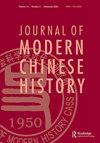Giving voice to the voiceless people in local society: an interview with Wang Di, June 6, 2018
IF 0.1
4区 历史学
Q4 HISTORY
引用次数: 0
Abstract
Wang Di was born in 1956 in Chengdu, Sichuan Province. The city, where Wang spent much of his youth, is located in the fertile plain of southwest China and is well known for its rich history and unique local culture. During the Cultural Revolution, Wang was sent to a rural village as a part of the government program to reeducate high school graduates, and then he became a factory worker. That experience may help explain his strong emotional attachment to the land and people in this region. In 1978, he was admitted to Sichuan University to study history. Seven years later, he graduated with a master’s degree in history and joined the faculty of the university. He was promoted to associate professor in 1987 for his extraordinary performance in teaching and scholarly achievements. Wang’s early research examines the social history of the upper Yangtze River region with the Sichuan basin as its focus. Drawing on Skinner’s macroregion theory, Wang treated the entire upper Yangtze River region as an organic unit with its own distinctive economic, social, and cultural identity. He was also influenced by the French Annales School, especially Fernand Braudel, who is known for his three levels of time: the environment, society, and events. Wang traced the historical transition of the upper Yangtze River region from a relatively isolated traditional society to a modern community. Supported by rich empirical sources, he painted a vivid picture of the region’s natural environment, demographic diversity, agricultural patterns, handicraft industry, commercial activities, political structure, social organization, and educational conditions. In short, his work provides readers with encyclopedic information about this region during the early modern period. Although he started work on his study in 1980, it was not until 1993 that his monograph was published under the title Striding Out of a Closed World: The Social Transformation of the Upper Yangtze Region, 1644–1911 (Kuachu fengbi de shijie: Changjiang shangyou quyu shehui yanjiu, 1644–1911). By the time Wang’s first book was published in China, he had already started his new academic journey in the United States. In 1991, he was awarded a young scholar grant by the Committee on Scholarly Communication with the People’s Republic of China (CSCPRC) that allowed him to spend a year at the University of Michigan. During his stay in the US, he was fascinated by the cutting-edge scholarly work of European and American academics and decided to extend his stay so that he could learn more.为地方社会的弱势群体发声——访王迪2018年6月6日
王迪1956年出生于四川成都。这座城市位于中国西南部肥沃的平原上,王在那里度过了他的大部分青春时光,以其丰富的历史和独特的地方文化而闻名。文化大革命期间,作为政府高中毕业生再教育计划的一部分,王被送到农村,然后他成为了一名工厂工人。这一经历或许有助于解释他对这片土地和这一地区人民的强烈情感依恋。1978年,他被四川大学历史系录取。七年后,他获得了历史学硕士学位,并加入了该大学的教师队伍。1987年,由于在教学和学术方面的突出表现,他被提升为副教授。王的早期研究以四川盆地为重点,考察了长江上游地区的社会史。他借鉴斯金纳的宏观区域理论,将整个长江上游地区视为一个有机的整体,具有独特的经济、社会和文化特征。他也受到了法国年鉴学派的影响,尤其是布罗代尔,他以时间的三个层次而闻名:环境、社会和事件。他追溯了长江上游地区从一个相对孤立的传统社会到一个现代社会的历史变迁。在丰富的经验资料的支持下,他生动地描绘了该地区的自然环境、人口多样性、农业模式、手工业、商业活动、政治结构、社会组织和教育状况。简而言之,他的作品为读者提供了关于这个地区早期现代时期的百科全书式的信息。虽然他从1980年开始研究,但直到1993年,他的专著《走出封闭的世界:长江上游地区的社会转型,1644-1911》(Kuachu fengbi de shijie: Changjiang shangyou quyu shehui yanjiu, 1644-1911)才出版。当王的第一本书在中国出版时,他已经开始了他在美国的新的学术之旅。1991年,他获得了中华人民共和国学术交流委员会(CSCPRC)颁发的青年学者奖学金,在密歇根大学学习了一年。在美国期间,他被欧美学者的前沿学术工作所吸引,决定延长他的停留时间,以便他能学到更多。
本文章由计算机程序翻译,如有差异,请以英文原文为准。
求助全文
约1分钟内获得全文
求助全文

 求助内容:
求助内容: 应助结果提醒方式:
应助结果提醒方式:


